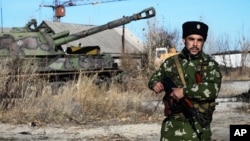The conflict in eastern Ukraine is intensifying. Russian military forces concentrated along the border and frequent violations of the cease-fire agreement reached in September between Kyiv and Moscow-backed separatists, lead many American experts to believe the situation in the region has become very dangerous.
As Russia's military builds up along the border, fighting continues between Ukrainian government and separatist forces. Some U.S. observers say Western governments need to find a realistic strategy for dealing with the crisis.
Jeffrey Mankoff, deputy director of the Russia and Eurasia Program at the Center for Strategic and International Studies (CSIS) in Washington D.C., says it has been clear since this past summer that the areas in eastern Ukraine controlled by pro-Russian separatists are no longer under the authority of the Ukrainian state.
He said that while Western governments support the Ukrainian government's Western-leaning aspirations, they have not really come to grips with what has happened in eastern Ukraine, much less found an effective way to deal with it.
“Under the circumstances that exist right now, I do not think that Russia has much of an incentive, either positive or negative, to withdraw that support [for the separatists]," he said. "In part this is the result of the failure of the West to develop a policy that puts enough Russian interests at risk to convince Moscow that there is risk and danger by going down this path."
If the conflict persists, Mankoff says, arming Ukraine to deal with the separatists will eventually become imperative.
John Herbst, director of Atlantic Council’s Dinu Patriciu Eurasia Center and a former U.S. Ambassador to Ukraine, said that the crisis in Ukraine has escalated to a war that is “partly covert, partly not so covert.” Russian President Vladimir Putin, he said, is determined to destabilize Ukraine by supporting the separatists in eastern Ukraine, and seeks to turn the region into a permanent problem for Kyiv.
The Western powers, said Herbst, should increase pressure on Moscow by supplying Kyiv with arms.
“We have seen sanctions, we have seen some strengthening of NATO guarantees to the most eastern members, especially to the Baltic states," he said. "What we have not seen, which should be very useful, would be the supply of weapons to Ukraine, so it can prevent Mr. Putin from conducting further aggression."
Karl Altau, managing director of the Joint Baltic American National Committee, said that only the consistent application of severe sanctions, especially those targeting Russia's energy sector and political leadership, has any hope of forcing Moscow to alter its course in Ukraine.
“Without that, they are not going to feel the pressure and will continue to take advantage of cracks in any kind of European and Western solidarity," said Altau.
Eric Shiraev is professor of international relations and political psychology at George Mason University in Fairfax, Virginia, and author of several publications on U.S.-Russian relations. He says that the conflict in Ukraine has served the interests of Putin and his government by giving them an issue with which to rally Russian public support.
Still, he says a hopeful sign is that a growing number of Russian political analysts have begun voicing criticism of their government's actions in Ukraine.
"Now we see a growing tendency among political analysts, especially the brave ones, to express their opinion and to criticize the policies of Moscow. Maybe it will help to resolve the conflict around Ukraine," he said. "More and more sober and rational voices that assess the situation not from the nationalistic and emotional perspective, but they just give quite a critical and rational assessment of what is going on in Ukraine, Crimea and eastern Ukraine."
The conflict in eastern Ukraine has claimed more than 4,000 lives since April.




